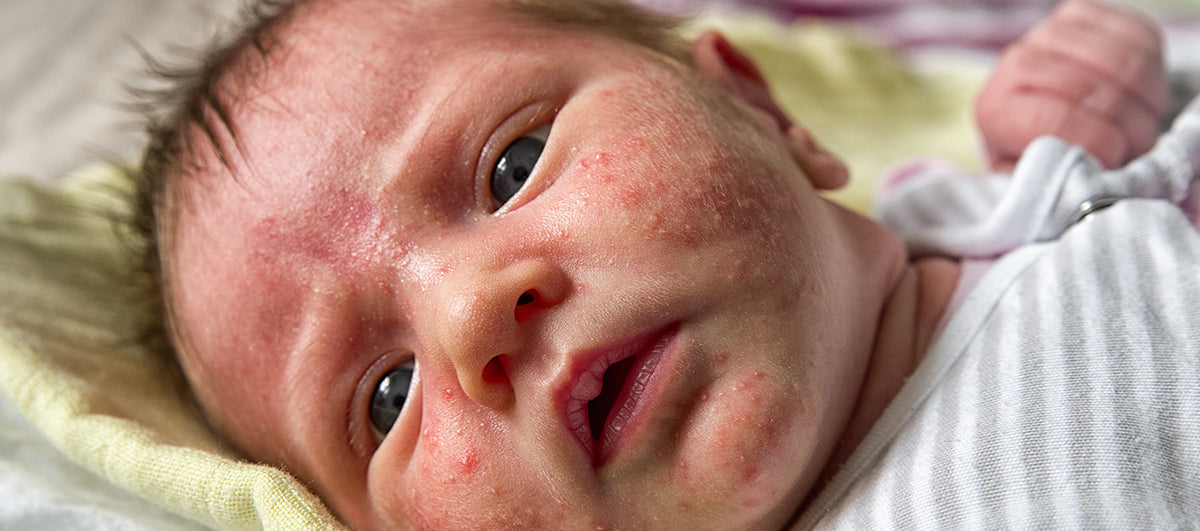It is common for toddlers to experience acne. However, no parent would like to see any pesky acne on their little angel’s face. It certainly can be worrisome, to say the least. Acne in babies is also known as neonatal acne. It usually occurs in cheeks, forehead and chin. Some studies explain that acne is caused by maternal hormones that tend to circulate in your baby after birth. However, there can be various other reasons that can lead to it.
WHAT IS ACNE?
Top dermatologists explain that acne is a skin condition that occurs when hair follicles get clogged with sebum (natural oil of the skin), unwanted dirt or debris. This causes inflammation in the follicles and irritation to skin. Every child experiences different symptoms of acne such as getting small, dark bumps or reddish, inflamed and pus-filled pimples etc. A 2016 study unravelled that the acne symptoms are usually present in places with a high concentration of sebaceous glands like face, shoulders, chest etc. There are various causes that can lead to acne in toddlers.
MAIN CAUSES
- Dairy intake
- Clothing accessories
- Medicines
- Harsh skin irritants
- Food allergies

1. Dairy intake
Dairy intake is known usually increases the chances of acne in people between the age of 9 and above. However, a research study presented in National Institutes of Health shows that dairy intake makes toddlers susceptible to acne. What’s more, some researches show that breast milk given to babies can be a potential cause of acne if the mother is experiencing hormonal disturbances.
2. Clothing accessories
Adorning your little ones in various beautiful accessories does seem like an enticing idea. However, it is only wise to acknowledge that it can be a potential reason behind acne. Covering with numerous accessories, especially during the humid season can cause pimples, acne, rash etc.
3. Medicines
While nursing, infants are exposed to maternal hormones. Which is why, if you are still nursing your toddler then it is only wise to double-check your medicine intake. The use of medicines such as antidepressants, antibiotics etc taken by nursing mothers can cause acne and pimples in toddlers.
4. Harsh skin irritants
Certain irritants from soaps and cleansers tend to trigger the pH balance of your child’s skin, leading to acne, pimples and rashes. It is why you should always understand the skin type of your child has before investing in products suitable for their skin type. Not only will it save your child from some skin trouble like rashes, acne etc but also provide healthy skin.
5. Food allergies
Numerous studies have clarified that skin conditions such as acne are a common symptom of food intolerance, especially in toddlers. All kinds of foods have the potential to trigger acne. As a result, you should always be on the lookout for what suits your child and what doesn’t.
IMPORTANT TIPS TO CONSIDER
- Top dermatologist reveals that certain skincare products contain harsh chemicals like silicone, sulphate, paraben. These ingredients can severely harm your child’s skin by causing redness, irritation, clogged pores, acne etc. It is why you should always examine the ingredients present in your child’s skincare and hair care products before investing.
- Avoid scrubbing or over-cleansing the area of acne or pimples with a towel as that can irritate your child’s skin.
- Refrain from slathering lotion or creams on your toddler’s face, as that will most likely aggravate the acne and pimples.
- Needless to say, while your toddler is going through the phase of teething it can cause excess saliva to drool. This gives rise to the development of drool rash around your child’s mouth. It appears red, inflamed that is often confused with acne. However, it is essential to understand that the cause and treatment of drool rash and acne are different.

It is imperative to keep in mind that preventive care and prompt treatment for acne can go a long way for your child’s health. Most often than not, acne could be a way of your child’s body indicating an underlying health issue or deficiency. Ignoring it will do more bad than good by worsening your child’s acne. Understanding the symptoms and causes of acne while following a good line of treatment will certainly show fruitful results in no time.
P.S.
Paying a visit to a dermatologist would help to get a better idea about symptoms of acne that your child is experiencing and what line of treatment would be best. What’s more, it will help to identify any underlying problem. It is especially vital to consult a dermatologist if your child’s acne is getting worse.




